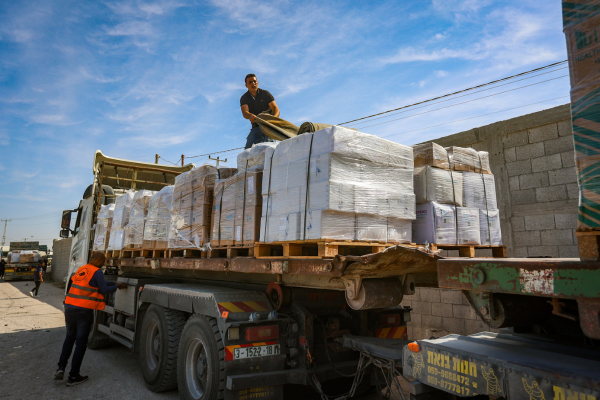In recent weeks, Hamas, the United Nations, international relief groups, and others accused Israel of placing Gazans at risk for imminent starvation.
By David Issac, JNS
The Popular Resistance Committees, a coalition composed of Hamas and other terrorist groups, recently announced price drops for food in the Gaza Strip.
Gazan merchants said, “An average family can now buy products for a hearty meal with 100 shekels [$27.15], compared to 200 shekels required for such a meal just a few days ago,” Ynet reported.
The news is in line with a report issued last week by the Israeli Defense Ministry’s Coordination of Government Activities in the Territories (COGAT) unit, which has been coordinating aid for Gaza.
According to COGAT’s latest statistics, 205 aid trucks were inspected and sent into the Gaza Strip on Sunday.
Also on Sunday, 232 packages with “hundreds and thousands of meals” were airdropped over Gaza’s north.
In addition, tankers of cooking gas and fuel for essential infrastructure were delivered.
Twenty-one bakeries are operating in Gaza, providing more than 2 million breads, rolls and pita breads a day, COGAT said.
In recent weeks, Hamas, the United Nations, international relief groups and others accused Israel of placing Gazans at risk for imminent starvation. The allegations were quickly picked up by Western media.
The storm over the impending food shortage reached a climax with the issuance of a March 18 report by the Integrated Food Security Phase Classification (IPC) multi-partner initiative claiming that 578,000 Gazans were facing “acute food insecurity.”
COGAT released a report on March 29 refuting the IPC’s assertions, noting, “In recent months between 150 and 200 trucks are admitted per day, most of which are food trucks. This is an 80% spike in comparison to the daily average food trucks that entered Gaza pre-October 7.
“The report alleges that the amount of water is less than 1 liter per day per person,” COGAT said, but based on its assessment “the daily average quantity of water [is] over 20 liters of drinking and cooking water per person per day.”
The IPC report’s assertions appeared disconnected from facts on the ground as COGAT noted the IPC called for restoring humanitarian access across the Gaza Strip when Israel had already facilitated aid access to the entire territory.
IPC report: The report does not reflect the full situation in the Gaza Strip in regard to food security and availability of food.
Our response to the IPC food and food security report: https://t.co/mjOUmOnFjc
— COGAT (@cogatonline) March 29, 2024
“For example, since the beginning of March, Israel facilitated over 350 trucks to northern Gaza as well as coordinations to refuel and resupply hospitals and health centers,” COGAT said.
“Additionally, since the beginning of the war, IDF has coordinated over 3,350 humanitarian movement[s] within the Gaza strip,” it added.
“We do not take lightly the assertions of international organizations such as the IPC. As detailed above, we note there are inaccuracies in the report as well as failing to mention Israel’s considerable efforts to improve the humanitarian situation,” COGAT said.
Send Passover Packages to Needy Israeli Soldiers - Bring Them Joy!
We are honored to thank the young men and women of the IDF who risk their lives every day to protect the citizens of Israel. Soldiers have been in Gaza, Lebanon and Syria for extended periods - many are hoping to come home for Passover.
Join us in sending Passover food packages (and personal notes) to Israeli soldiers and their families.
Many soldiers spend the Passover holiday with needy families back home. The soldiers greatly appreciate your love and concern. Bring them Passover joy!
CLICK HERE TO SEND YOUR PACKAGE AND NOTE TO ISRAELI SOLDIERS!
